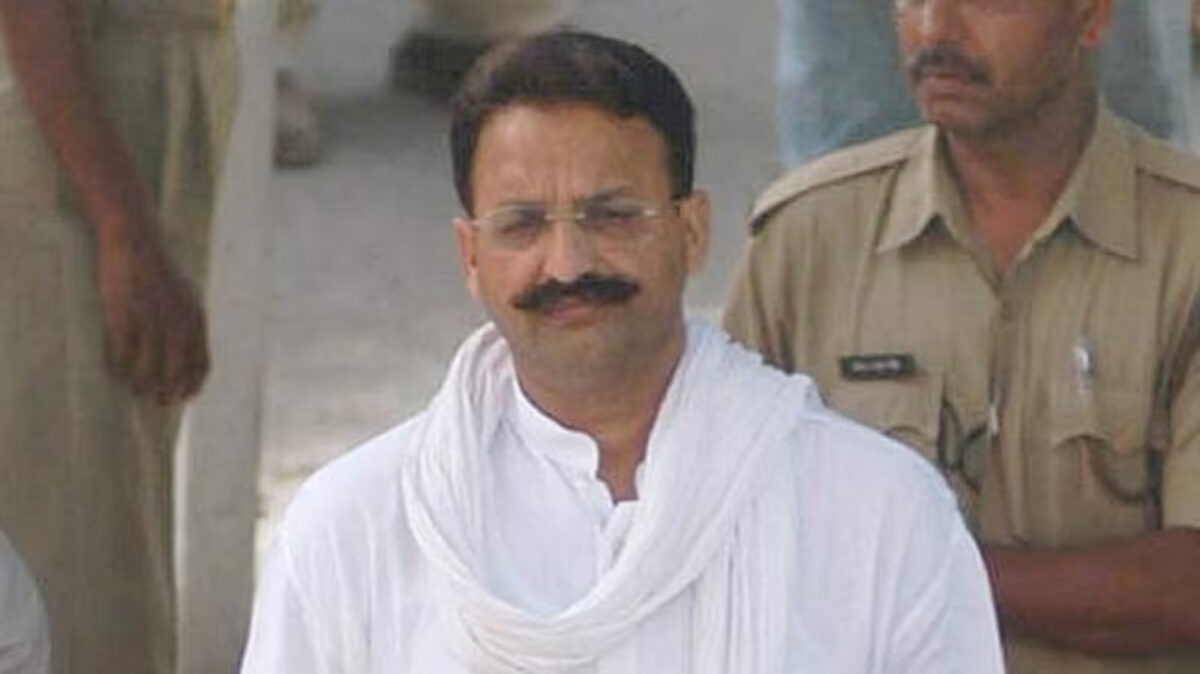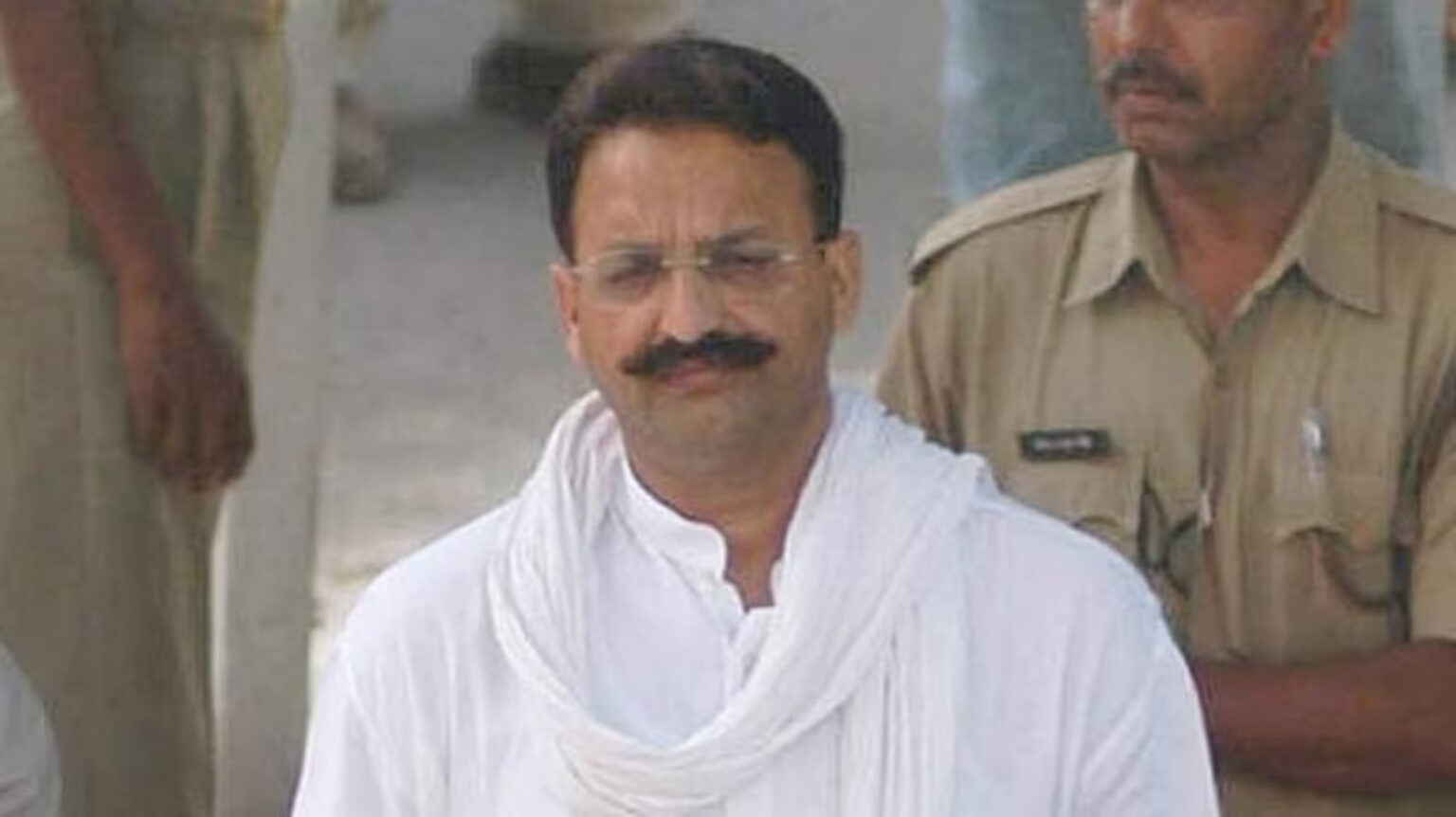Mukhtar Ansari, a seasoned five-term MLA, is currently serving a 10-year prison sentence for his involvement in a separate kidnapping and murder case
Jailed gangster Mukhtar Ansari faced a significant development today as he was convicted by a court in Varanasi, Uttar Pradesh, in a high-profile 32-year-old murder case. The court delivered a verdict of guilty and sentenced him to life imprisonment, marking a significant chapter in Ansari’s controversial and crime-ridden life. Ansari, a five-time MLA known for his political influence and criminal connections, stood accused of orchestrating the murder of Awadhesh Rai, a Congress leader, back in 1991.

The incident, which sent shockwaves through the political landscape, took place on a fateful day, August 3, 1991, in Varanasi. Awadhesh Rai, the brother of former MLA Ajay Rai, was brutally shot dead outside his brother’s residence. The murder carried out in broad daylight, served as a grim reminder of the pervasive violence and criminal activities that plagued the region. What made this case particularly significant was the fact that Mukhtar Ansari was not serving as an MLA at the time he committed this heinous crime.
Mr Rai, in an act of courage and determination, named Mukhtar Ansari, along with Bhim Singh, former MLA Abdul Kalim, and two others, in the First Information Report (FIR) filed with the police. Their names became synonymous with political criminality and corruption in Uttar Pradesh. The conviction, in this case, is just one among Ansari’s extensive rap sheet, which now boasts a total of six convictions in 61 criminal cases. Furthermore, there are an additional 20 cases pending trial in various parts of the state, underscoring the magnitude and scale of his alleged criminal activities.
While the recent conviction in the Awadhesh Rai murder case is a significant milestone, it is worth noting that Ansari had already been handed a 10-year jail term earlier this year in April for his involvement in another case involving kidnapping and murder. This indicates a pattern of criminal behaviour and a blatant disregard for the law.
The Varanasi MP MLA court, after months of proceedings and deliberations, concluded the hearing in the Awadhesh Rai case following final arguments on May 19. The court reserved its order, eagerly awaited by the public and the families of the victims, and set June 5 as the date for the delivery of the verdict.
Throughout the investigation and trial, the case was placed under the purview of the Crime Branch-Criminal Investigation Department (CB-CID), ensuring a thorough examination of the evidence and a fair trial.
Mukhtar Ansari’s political career, intertwined with his criminal activities, has been marked by both triumphs and controversies. Despite being incarcerated, Ansari managed to secure victory in five consecutive assembly elections, emerging as a prominent political figure in Uttar Pradesh. His wins in the years 1996, 2002, 2007, 2012, and 2017 showcased the perplexing nexus between crime and politics in the region. It is worth highlighting that his last three electoral victories occurred while he was behind bars, raising questions about the integrity of the electoral process and the influence of criminal elements in politics.
Furthermore, his son, Abbas Ansari, recently made headlines by winning the Uttar Pradesh assembly election in 2022 from Mau Sadar, the Ansari family’s stronghold. Abbas represented the Suheldev Bharatiya Samaj Party (SBSP), further emphasizing the entrenchment of Ansari’s family in the political landscape of the state.
Mukhtar Ansari’s name first gained notoriety in connection with the 1988 murder of local contractor Sachchidanand Rai. This incident is believed to have marked his initial foray into the realm of organized crime, subsequently leading to a long list of criminal activities. Ansari’s involvement in cases of land grabbing, murder, and extortion resulted in nearly 60 criminal cases being registered against him, painting a chilling picture of his alleged criminal empire.
One of the most sensational and politically charged incidents involving Ansari was the assassination of BJP MLA Krishnanand Rai in November 2005. Ansari was accused of masterminding the murder and allegedly used an AK-47 rifle in the execution.
The crime scene was reportedly strewn with approximately 400 bullet shells, underscoring the intensity of the attack. The post-mortem examination revealed the recovery of 21 bullets from Krishnanand Rai’s body, leaving an indelible mark on Uttar Pradesh’s political history.
In 2010, Ansari faced further charges relating to the murder of Ram Singh Maurya, a witness in the killing of Mannat Singh, a local contractor allegedly murdered by Ansari’s gang in 2009. These incidents shed light on a disturbing pattern of criminal activities associated with Mukhtar Ansari, emphasizing the need for the judicial system to address such cases thoroughly and ensure justice is served.
The conviction in the Awadhesh Rai murder case is a significant step towards holding Mukhtar Ansari accountable for his alleged crimes. It serves as a reminder that no one is above the law, regardless of their political connections or influence. The judiciary’s role in delivering justice and upholding the principles of law and order is crucial, especially in cases that involve prominent figures and high-profile crimes.
As the legal proceedings unfold, it is essential to maintain transparency, impartiality, and adherence to due process. The verdict in the Awadhesh Rai case, coupled with the pending trials in other cases, will shape the narrative surrounding Mukhtar Ansari and his alleged involvement in criminal activities. The outcome of these trials will not only impact Ansari’s future but also have broader implications for the fight against organized crime and the integrity of the political system in Uttar Pradesh.
In conclusion, the conviction of Mukhtar Ansari in the 32-year-old murder case of Awadhesh Rai is a significant development in a long history of criminal activities. Ansari’s six convictions out of 61 criminal cases, along with 20 pending trials, highlight the extent of his alleged involvement in organized crime.
The upcoming verdict holds considerable importance, not only for the victims and their families but also for the judicial system’s ability to deliver justice and maintain the rule of law. It serves as a reminder that no individual, regardless of their political power, should be exempt from the consequences of their actions.












